
Journal of Immunotoxicology
Scope & Guideline
Innovating Research for a Healthier Tomorrow
Introduction
Aims and Scopes
- Immunotoxicology of Environmental Chemicals:
The journal focuses on the impact of environmental pollutants, such as per- and polyfluoroalkyl substances (PFAS) and heavy metals, on immune system function and associated health outcomes. - Mechanistic Studies of Immune Modulation:
Research often explores the mechanisms underlying immune modulation, including cytokine interactions, immune cell activation, and the role of specific immune pathways in response to toxins. - Development of Immunological Assays:
The journal publishes studies on innovative methodologies for evaluating immune responses, including in vitro assays and animal models to assess immunotoxicity and vaccine efficacy. - Clinical and Translational Immunotoxicology:
Research in this area bridges laboratory findings to clinical implications, examining how immunotoxicological findings can inform public health policies and therapeutic strategies. - Biomarkers of Immune Response:
There is a consistent emphasis on identifying biomarkers that can indicate immune system changes in response to chemical exposures, aiding in the assessment of immunotoxicity.
Trending and Emerging
- Impact of Nanoparticles and Novel Materials on Immunity:
Research on the immunotoxic effects of nanoparticles and novel materials is gaining traction, with studies focusing on their interactions with immune cells and potential health risks. - Environmental Influences on Immune Function:
Increasing attention is being paid to how environmental factors, including exposure to mixtures of chemicals, affect immune responses, particularly in vulnerable populations. - Integration of Genomic and Proteomic Approaches:
Emerging studies utilizing genomic and proteomic techniques to identify biomarkers and mechanisms of immunotoxicity are becoming more prevalent, advancing personalized medicine in immunotoxicology. - Therapeutic Applications of Immune Modulation:
Research exploring therapeutic interventions that modulate immune responses, such as the use of cytokines or immune checkpoint inhibitors, is an emerging theme reflecting the journal's focus on translational research. - Health Impacts of Microbiome on Immunotoxicity:
There is a growing body of work examining the role of the microbiome in mediating the effects of environmental exposures on immune health, indicating a trend toward understanding complex interdependencies.
Declining or Waning
- Traditional Allergens and Hypersensitivity Studies:
Research focused on classic allergens and their immunological effects appears to be decreasing, possibly as newer methodologies and broader environmental factors gain attention. - General Toxicity Studies Without Immunological Focus:
Studies that primarily address general toxicological effects without a specific focus on immunological implications are becoming less common, reflecting a trend toward more specialized research. - Basic Mechanistic Studies on Cytokine Profiles:
There seems to be a waning interest in basic studies solely examining cytokine profiles without linking them to specific toxicological or environmental exposures.
Similar Journals
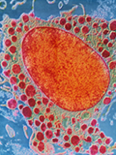
Annual Review of Immunology
Advancing the Frontiers of Immunological ResearchThe Annual Review of Immunology, published by Annual Reviews, is a premier journal that has been contributing to the field of immunology since its establishment in 1983. With a strong reputation highlighted by its impressive impact factor and top-tier rankings—holding the Q1 category in both Immunology and Immunology and Allergy, alongside significant Scopus Rankings—this journal serves as an essential resource for researchers, professionals, and students alike. The Annual Review of Immunology covers the latest advancements and critical developments in the domain, fostering a better understanding of immune responses and disorders. Although it is not an open-access journal, it provides comprehensive reviews that synthesize emerging data and trends, making it indispensable for those at the forefront of immunological research. With volumes anticipated through 2024, it continues to set the standard for high-quality scholarly publications in the field.

CANCER IMMUNOLOGY IMMUNOTHERAPY
Unraveling the Complexities of Immunology and OncologyCancer Immunology Immunotherapy, published by Springer, stands as a premier journal in the fields of cancer research and immunology, holding a prestigious Q1 ranking across multiple categories, including Oncology and Medicine as of 2023. With an ISSN of 0340-7004 and an E-ISSN of 1432-0851, this journal has been a pivotal platform for groundbreaking research since its inception in 1976, continuing to provide insight into the complex interactions between the immune system and cancer. The journal's scope encompasses a wide array of topics, including novel therapeutic strategies, immunological mechanisms, and translational science aimed at advancing treatment outcomes for cancer patients. Renowned for its rigorous peer-review process and high impact factor, it attracts contributions from leading experts and researchers around the globe, positioning itself among the top-tier publications with Scopus rankings that reflect its vital role in advancing the field. Access options are generally subscription-based, ensuring a comprehensive resource for professionals and academics seeking to deepen their understanding and make meaningful contributions to cancer immunotherapy.

IMMUNOPHARMACOLOGY AND IMMUNOTOXICOLOGY
Elevating Knowledge in Immunopharmacology and Toxicological ScienceImmunopharmacology and Immunotoxicology, published by Taylor & Francis Ltd, is a distinguished academic journal with a focus on the interrelation between pharmacology, immunology, and toxicology. Established in 1978, the journal serves as a vital platform for the dissemination of cutting-edge research aimed at enhancing the understanding of immunologically mediated drug responses and toxic effects. The journal encompasses a broad scope of topics relevant to the fields of immunology, pharmacology, and toxicology, offering insights that are pivotal for both academia and the pharmaceutical industry. With a commendable 2023 impact factor and ranking in Q3 in Immunology and Q2 in both Pharmacology and Toxicology, it holds a respected position within its categories, making it a valuable resource for researchers, professionals, and students seeking to stay abreast of the latest developments in the field. The journal is accessible through traditional subscription models and encourages submissions that bring forth innovative findings that might influence therapeutic strategies and public health.
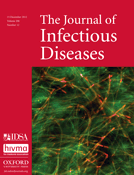
JOURNAL OF INFECTIOUS DISEASES
Unraveling Complexities in Infectious Disease ResearchThe JOURNAL OF INFECTIOUS DISEASES, published by OXFORD UNIV PRESS INC, is a leading peer-reviewed journal dedicated to advancing the understanding of infectious diseases through high-quality research. With an impressive impact factor reflecting its prominence in the field—ranking in the Q1 category for both Immunology and Allergy and Infectious Diseases—this journal serves as a pivotal platform for researchers, healthcare professionals, and students alike. Its extensive history, spanning over a century since its inception in 1904, highlights its established authority and commitment to the field. Based in the United Kingdom, the journal covers essential topics from clinical management to epidemiological trends, providing vital insights that inform practice and policy. Although the journal is not open access, it remains accessible to a wide audience, ensuring that critical research continues to drive innovation and best practices in infectious disease management.

Immunotherapy Advances
Advancing the frontier of immunology with cutting-edge research.Immunotherapy Advances, published by Oxford University Press, stands at the forefront of the rapidly evolving field of immunology and microbe interactions, focusing specifically on novel immunotherapeutic strategies and their clinical applications. Established in 2021, this peer-reviewed journal aims to disseminate high-quality research that contributes to the understanding and advancement of immunotherapeutic techniques, potentially transforming patient care in immunology. With a current Scopus rank of #140 out of 236 in the realm of Immunology, placing it in the 40th percentile, Immunotherapy Advances is positioned to be an integral resource for researchers, healthcare professionals, and students eager to stay updated with groundbreaking findings and methodologies. The journal is dedicated to fostering innovative discussions and collaborations, ensuring open access to vital research that influences treatment paradigms globally.
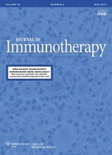
JOURNAL OF IMMUNOTHERAPY
Exploring Innovative Pathways in ImmunotherapyJOURNAL OF IMMUNOTHERAPY, published by Lippincott Williams & Wilkins, is a premier journal dedicated to advancing the field of immunotherapy, a vital aspect of contemporary cancer research and treatment. With an ISSN of 1524-9557 and an E-ISSN of 1537-4513, this esteemed journal has been disseminating cutting-edge research since 1991 and continues to thrive with a convergence of knowledge leading into 2024. Recognized in the top Q2 quartile for fields such as Cancer Research, Immunology, and Allergy, as well as achieving a Q1 ranking in Pharmacology, the journal serves as a critical resource for researchers, clinicians, and students alike. Its robust impact is reflected in its competitive Scopus rankings across various categories, where it holds significant percentile standings. Highly regarded in the academic community for its rigor, the JOURNAL OF IMMUNOTHERAPY aims to provide a platform for innovative ideas, clinical findings, and experimental research that propels the science of immunotherapy forward. Although it does not offer open access, the journal ensures that its contents remain accessible and impactful for professionals in the field, fostering collaboration and knowledge exchange in an era where immunotherapy holds the promise for breakthroughs in patient care.
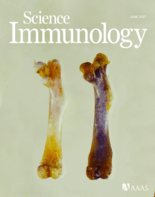
Science Immunology
Exploring the Depths of Immune ResponsesScience Immunology, published by the American Association for the Advancement of Science, is a leading journal in the field of immunology, recognized for its significant impact and rigor in advancing our understanding of immune responses and complex diseases. With an impressive impact factor that places it in the Q1 category of both immunology and allergy, as well as miscellaneous medicine, this journal is ranked #7 and #8 in their respective Scopus categories, reflecting its high-quality research output. Since its inception in 2016, Science Immunology has been at the forefront of interdisciplinary immunological research, fostering crucial insights that link immunology with pressing health challenges. The journal is committed to providing open access to its content, ensuring that groundbreaking findings are accessible to a global audience of researchers, professionals, and students. Its anthology not only addresses fundamental immunological mechanisms but also enhances the dialogue on translational applications and therapeutic interventions, solidifying its position as an essential resource within the scientific community.
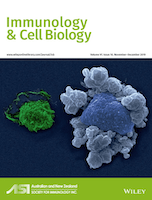
IMMUNOLOGY AND CELL BIOLOGY
Fostering Knowledge in Immunology and Cellular MechanismsIMUNOLOGY AND CELL BIOLOGY, published by Wiley, serves as a prominent platform for disseminating cutting-edge research in the fields of immunology and cell biology. With an ISSN of 0818-9641 and an E-ISSN of 1440-1711, this journal has established itself since its inception in 1987, demonstrating a commitment to advancing knowledge in its disciplines through high-quality articles. Renowned for its rigorous peer-review process, it holds a Q2 quartile ranking in both immunology and cell biology categories as of 2023, showing its competitive stature in these fields. IMUNOLOGY AND CELL BIOLOGY is indexed among the elite journals worldwide, with impressive Scopus rankings, including a rank of #75/233 in Immunology and Allergy. The journal’s comprehensive scope ensures that it caters to an audience of researchers, professionals, and students who are dedicated to exploring the intricate mechanisms of immune responses and cellular interactions. Although it does not operate under an open access model, its subscription-based content remains invaluable for those seeking to broaden their understanding of immunology and cell biology. By providing a forum for significant scientific dialogue, IMUNOLOGY AND CELL BIOLOGY continues to shape the future of research in these vital areas.
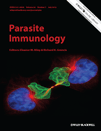
PARASITE IMMUNOLOGY
Unraveling the Mysteries of Parasitic Interactions.PARASITE IMMUNOLOGY, published by Wiley, is a leading journal in the field of immunology and parasitology, with an ISSN of 0141-9838 and E-ISSN of 1365-3024. Since its inception in 1979, it has played a pivotal role in advancing our understanding of host-parasite interactions, immunological responses to parasitic infections, and the mechanisms of immunological resistance. The journal is adeptly positioned within the academic community, currently holding a prestigious Q2 ranking in Parasitology and a Q3 ranking in Immunology for 2023, indicating its significant influence and relevance. Its comprehensive scope attracts a diverse readership, contributing to the discourse surrounding novel therapeutic approaches and emerging challenges in parasitic diseases. With a consistent convergence of research until 2024, PARASITE IMMUNOLOGY is an essential resource for researchers, professionals, and students seeking to deepen their knowledge and foster collaboration in these dynamic fields. Although it is not an open-access journal, the insights shared within its pages are invaluable for shaping future research trajectories.

BMC IMMUNOLOGY
Empowering Researchers with Cutting-Edge InsightsBMC Immunology is a prominent open-access journal published by BMC that has been at the forefront of immunological research since its inception in 2000. Based in the United Kingdom, this journal aims to advance the understanding of immune system functions and disorders through high-quality, peer-reviewed articles. With an impressive scope encompassing various facets of immunology, BMC Immunology has earned a Q3 ranking in the Immunology category according to the 2023 category quartiles, demonstrating its growing impact and relevance in the scientific community. Researchers and professionals will find valuable insights in its array of published works, spanning both foundational studies and innovative applications. The journal's commitment to open access ensures that cutting-edge research is freely available, fostering collaboration and advancement in the field. For those looking to stay updated on the latest developments in immunology, BMC Immunology stands as an essential resource for researchers, professionals, and students alike.